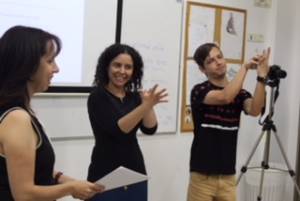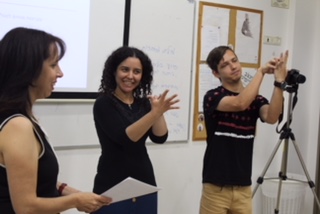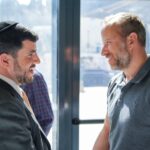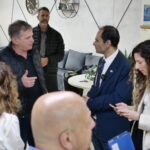On December 3rd, 2018, the world will mark the International Day of Persons with Disabilities, which makes it a very suitable occassion to present a unique project called Learning in Silence, which has been running in Sci-Tech Hermelin College for over ten years, and aims to accommodate deaf and hard-of-hearing students in the college’s Practical Engineering programme.
Over the past few years, there have been some considerable shifts in society’s perception of people with disabilities, thanks to legislative measures in Israel and around the world which established their legal rights. At the same time, there has been growing awareness to the integration of people with disabilities into higher education institutions. The numbers of students with disabilities rose, which also affected their representation in the employment market.
Sci-Tech Hermelin College in Netanya operates a project aiming to accommodate deaf and hard-of-hearing students in the college’s various courses. The project is led by Leora Ribofsky, coordinator of the college’s support framework for deaf and hard-of-hearing students – which is also a sign language translator – along with Iris Wolf, the college’s Dean of Students. The project’s objective is to train students who are hard of hearing towards a Practical Engineering qualification, and to provide them with tools which will enable them to secure a job and gain independence. Such students can be found in all the college’s departments: visual communication, electricity and electrical engineering, mechatronics, industrial management, as well as the programmes in the Diploma Studies Department.

The college furnishes the students with an aid and support framework, including adaptations of their study environment to their needs, such as sign language translators, use of technical aids, unique teaching methods, additional tuition, and unique workshops addressing learning and communication strategies. These students have the benefit of dedicated staff looking after them, accompanying them in any professional aspect as necessary, and maintaining continuous communication with them and with any relevant external stakeholders.
Iris Wolf notes that “our college is very proud of this project, in light of the many success stories it has accumulated over the years. This project is part of the college’s overall vision in regards to offering equal opportunities to all our students, maximizing their skills and their capabilities, and propelling them forward in the course of their personal life, while at the same time cultivating their sensitivity and tolerance to their surroundings, and encouraging their altruistic tendencies. Thankfully, today we can acknowledge with confidence that this project has plenty of added values, and that it contributes to the body of students in our college as a whole, both academically and socially.”
Leora Ribofsky says: “the underlying assumption behind this programme is that a higher level of education means higher chances for a person, particularly one with special needs, to gain financial independence and to find his or her place in the job market, and in society in general. This will bring about improvement in this person’s wellbeing and social position, as well as enhanced sense of belonging and a shift in social attitudes.”
Furthermore, during her studies for a Masters Degree in Special Education, Leora researched the programme’s implementation. Her study “Learning in Silence” explored the factors which contribute to the integration of deaf and hard-of-hearing students across the college’s courses.
Her research findings indicate multiple factors contributing to the successful integration of deaf and hard-of-hearing students. The factors are: the attitudes of various college officials in regards to integration; the support center’s position and role in the integration process; the importance of adaptations provided to students, and their influence on integration; and the contribution of additional support circles in the students’ learning environment, and their influence on the actual integration.
In addition, Leora’s study finds that the college’s tutors carry out the leadership’s vision, treating their students who are deaf or hard of hearing on equal terms as the other students. This is achieved through their personal views, through the use of technological and linguistic aids by them and their students, and through the support center’s assistance, as well as the adaptations provided.
Each factor in itself is a significant catalyst triggering a shift in perceptions, in the willingness to include and accommodate students who are hard of hearing. The combination and integration of all factors results in a broader picture reflecting the success of this integration effort. This is an indication of the measures and the processes undertaken within the college, in order to implement the concept of accessibility in line with the law concerning equal opportunities for people with disabilities.
The project, and the research examining it, led Leora to the conclusion that at the end of the day, the human factor is overwhelming. It boils down to our dedication, willingness, sensitivity, professionalism, empathy, resolution, and above all the belief that we are all equal. There is room for diversity, and it’s essential to ensure equal opportunity for all, not just to comply with legal requirements, but out of true resolve and understanding that we must do everything in our power to preserve each individual’s dignity, and to allow each person to realize his or her capabilities, both personally and professionally.







Comments are closed.